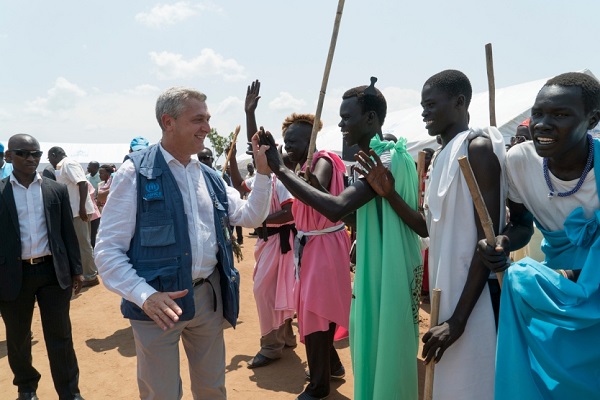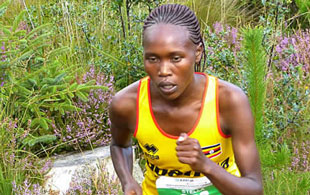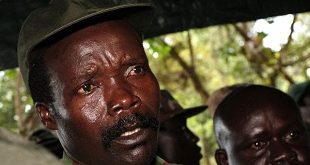
Filippo Grandi, the UN High Commissioner for refugees has called for greater international attention to the plight of South Sudanese refugees fleeing insecurity to South Sudan’s neighbours.
As he concluded his two-day visit to Uganda which was intended to assess the situation on the ground, Grandi appealed Wednesday to the leaders of South Sudan to behave responsibly and end the violence and instability.
“Leaders should not ignore the plight of their people,” he said citing armed conflict, rape of women and children, killings, abductions and the general state of lawlessness that has forced citizens of all ages to run away from different parts of the country.
Grandi, accompanied by Hillary Onek, Uganda’s Minister for Disaster Preparedness Management and Refugees and Rosa Malango, the United Nations Resident Coordinator in Uganda, and other senior officials had visited the northwestern district of Adjumani a day earlier where a majority of the 90,000 recent arrivals have sought refuge.
At Nyumanzi transit centre— a 3,500-capacity facility currently holding 7,000 refugees— Grandi heard refugees describe the terrifying acts of violence that have forced them to flee their home country.
Many of them told the High Commissioner that the prevailing insecurity would not end soon. He also saw first-hand the health and protection risks of overcrowding.
South Sudanese refugees have been entering Uganda since July 2016 using entry points in different districts, requiring major logistical operations to bring them to safety but the speed of the influx has stretched the capacities of the host communities in Uganda.
At Pagirinya Refugee Settlement, the UN refugee chief received a memorandum from the refugees outlining difficulties they are facing in the areas of water, food, shelter health and education.
The memorandum cited special concerns about the situation of children, among whom many are orphans, and youth. Established two months ago, Pagirinya has already reached full capacity with 22,000 refugees.
Still, Grandi noted that in his long experience working with refugees, he had rarely seen so many people settled with land, and with houses already constructed in such a short time.
The High Commissioner responded with assurances that he would spare no effort in calling for strong support from donors to meet their needs.
“It is unacceptable that the UN refugee appeal for South Sudanese refugees regionally is funded to the tune of 20-25% when all the attention is being put in all other refugee influxes.”
“I am not saying other influxes should not receive attention, I am saying this one should receive equal support,” Grandi said during a meeting with the media in Kampala.
Grandi also noted that it is important that the international community redoubles its effort to bring the leadership of South Sudan to reason and re-establish peace in the country because this is the main cause of the outflows into the neighbouring countries.
Emphasizing the need for urgent and predictable resources to avert a crisis, he applauded continuing efforts to prevent congestion, combat moderate and severe malnutrition among children, and carry out protection interventions.
Grandi praised Uganda’s approach to refugees in Adjumani: “I have been in many refugee situations, but nowhere in the world have I seen people settled with land, with shelter in less than two months”.
In Kampala, the High Commissioner met with Ugandan Prime Minister, Dr. Ruhakana Rugunda. He lauded Uganda’s solidarity with those fleeing wars in the region, and its forward-looking aspiration to work with the United Nations and partners to transform refugees into a productive economic force as a means to promoting regional stability.
“Uganda’s approach constitutes a rare example of a country unreservedly opening its doors to refugees and not treating them as a burden in a world where increasingly refugees are being turned away,” Grandi said.
He commended the strong partnership between humanitarian and development actors who are engaged in refugee response, and appealed for strong international support to aid the government of Uganda to maintain its solidarity with refugees. The Government of Uganda has gazetted land for refugee settlements, and gives plots for agricultural use to each rural-based refugee family.
Where land has not been gazetted, the government negotiates for land with leaders from the host community. Significantly, Uganda has included refugees in its national development strategy.
Rugunda said the government would continue with her tradition of welcoming refugees, handling them as humanely as possible; giving them the necessary tools, and capacity to ensure that they do not only live on their sweat while in Uganda but when they go back to their respective countries, they go back better equipped to be able to have better lives and to make contributions to the stabilization and normalcy in their countries.
“As far as Uganda is concerned, we are very happy with the work UNHCR is doing to support Ugandan efforts and we are more than ready to continue our close collaboration in our common struggle of improving refugees’ conditions and those of the host communities.”
Rugunda said he and the Uganda government agreed to intensify cooperation between the UNHCR, Uganda, her neighbours and the rest of the world to ensure that the humanitarian issues that accompany the problem of refugees are tackled not just by the entire international community because refugees wherever they may be require international support.
Grandi echoed the Prime Minister’s message saying Uganda’s continued policy not only of openness to new refugees who need protection but also to treating them as assets and not as a burden, treating them as contributors to the life of the country, to give them dignity and to make sure that local communities also benefit from that approach.”
He said the UNHCR fully support this policy which in UN terms is translated into the Re-Hope programme—the refugee and host population empowerment—a strategic framework which brings together the government, the World Bank and other UN agencies.
UNHCR intends to put up to $31 million of its core resources in 2016/17 into the Re-Hope programme while the World Bank has put aside up to $50 million in concessional loan that will also benefit this programme and is currently awaiting Parliament approval.
Grandi noted that the UNHCR will commit up to $14 million this year while the balance will be disbursed next year.
Although the practical aspects of how to implement the Re-Hope programme are still being discussed by both the government and the UN agencies, David Apollo Kazungu the commissioner for refugees said Re-hope will start this year and focus will be put on livelihoods, infrastructure and education for both the host communities and the refugees.
Grandi noted that when the 71st session of the UN General Assembly opens in New York later on in September where the heads of state will come up with responses to the growing phenomenon of immigrants, he will salute Uganda’s generous and forward looking refugee policies and also show case it as a model for many other situations.
“We want to use the New York Summit to showcase the Ugandan approach to refugees but also to flag it as it needs more support.”
“The theme for the New York Summit is, ‘Refugees are an international responsibility,’” he said, “We don’t want these to be mere words but concrete action; shared responsibility cannot only be about countries near the conflict that shoulder the biggest burden. It has to be shared and we have a model [here in Uganda] through which this sharing is possible.”
Uganda currently has a population of over 613,000 refugees and asylum-seekers and over 90% are from South Sudan, the Democratic Republic of Congo, Burundi and Somalia. A sizeable majority of the refugees arrived in the last five years.
***
editor@independent.co.ug
 The Independent Uganda: You get the Truth we Pay the Price
The Independent Uganda: You get the Truth we Pay the Price



